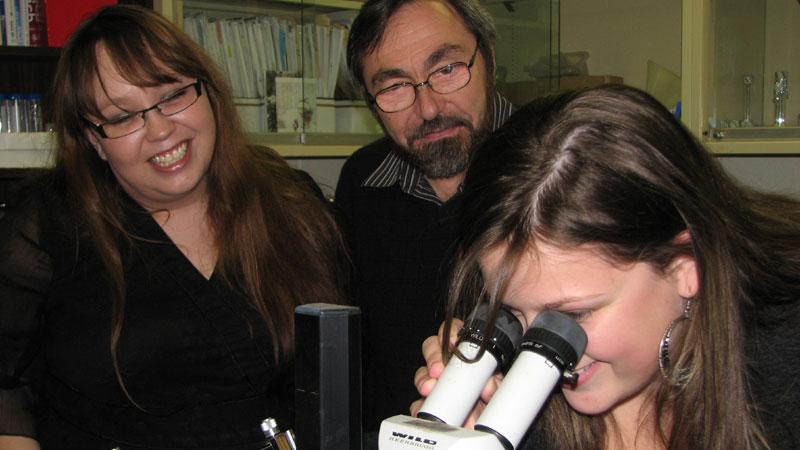 From left, Holly May, PhD candidate in Biological Sciences, Professor Joffre Mercier and Maja Milakovic, an MSc graduate from the Department of Biological Science, will discuss their research at the Nov. 15 Research Cafe.
From left, Holly May, PhD candidate in Biological Sciences, Professor Joffre Mercier and Maja Milakovic, an MSc graduate from the Department of Biological Science, will discuss their research at the Nov. 15 Research Cafe.
From left, Holly May, PhD candidate in Biological Sciences, Professor Joffre Mercier and Maja Milakovic, an MSc graduate from the Department of Biological Science, will discuss their research at the Nov. 15 Research Cafe.
The common fruit fly is a scientific marvel as a model organism for research in many areas, particularly genetics. But have you ever thought about what we may be able to learn from studying angry and hostile fruit flies?
Holly May, a PhD candidate in Biological Sciences, is pursuing new investigative research with fruit flies, as well as crayfish, to help understand how social experience influences behaviour, specifically in relation to aggression.
She will discuss her study as one of several presentations at the Nov. 15 Mapping the New Knowledges Research Café, “Targeting Health and Disease: New Frontiers in Biological Research.” The Research Café is a free public event and will be held from 4:30 to 6:45 p.m., in Pond Inlet. Refreshments will be provided.
The event will showcase advances being made by teams of faculty and graduate student researchers in the broad field of bioscience.
**
Holly May
PhD candidate Biological Sciences
Supervisor: Professor Joffre Mercier
Research area: Responses to Visual Stimuli Depend on Social Experience
Hometown: Port Robinson, Ont.
What is your area of research?
My research is focused on how social experience influences behaviour. Many species, through fighting and aggressive acts, develop social ranks within their community. These ranks often determine a member’s behaviour.
My work involves studying crayfish and fruit flies. As an undergraduate student in Neuroscience, I became intrigued by how we can use invertebrate model systems, such as of crayfish and fruitflies, to answer questions about behaviour that can then be applied to more complex neural systems, such as that in humans.
Who do you hope to help and how?
Aggression is seen throughout the animal kingdom and is the underlying cause of violence and war in our society. My research investigates the neural, genetic and hormonal contributions to aggression. I hope to help people understand aggression better by shedding light on what causes it and how behaviour can change as a result of it.
Although fruit flies have been used in genetic research for decades, their aggressive nature has only recently been studied and it is exciting to conduct research that is new and investigative.
What made you decide to pursue your graduate education at Brock?
I was attracted to the familial atmosphere at Brock. We have brilliant scientists in our department and each of them is available for advice and discussion regarding your research project. We have weekly seminars in Biology that provide the opportunity to meet and talk one to one with other researchers in your field and this gives one a chance to develop connections with researchers outside of Brock. I was also excited to have the opportunity to TA and be involved in undergraduate courses.
What are your other interests/hobbies/activities?
I am a wife and mother of two teenagers, and also an avid reader. When I’m not engaged in academic pursuits, I enjoy reading and spending time with my family.








